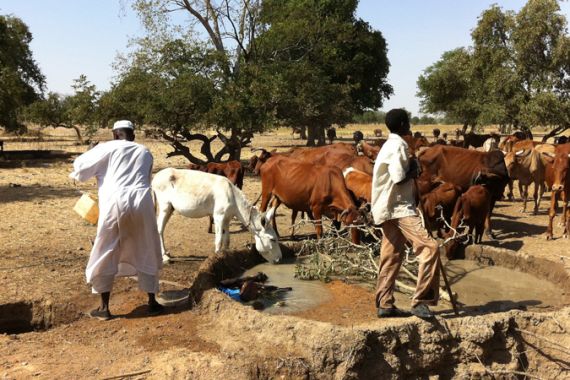Nowhere to turn for Sudan herders
In the first of a three-part series, we report on the challenges the referendum poses for Sudan’s nomadic tribes.

|
The tribe’s southern pastures are in what could become the new nation of South Sudan [Al Jazeera] |
Nick Clark has just returned from filming in South Kordofan state in Sudan – an area full of potential flashpoints north of the proposed border. This is the first in a series of three reports.
The sun is just up and in a haze of wood smoke the men rouse the camels as Um Khayal sits on her haunches and milks her cows. She is 15 years old and she is already the mother of two children – things happen fast out on the nomadic trail.
Her education is nothing and everything – it is all around her in the trees, in the weather and the ways of the elders. There is no school. There are no hospitals. They have no nation. They are simply the Misseriya, life in perpetual migration.
But now, being forced to stay in one place is creating problems.
“Our cows are not producing much milk because there’s not enough food or water for them,” says Um Khayal. “What can we do? We can’t go south and here – there’s nothing.”
Front line
This is the front line of an ancient existence battling against 21st century Africa. We all know what is going to give way.
For generations, way, way back in time, the pastoralists have taken their herds south then north, following the rains and the greening pastures.
House, home and hearth loaded up on camels, the children follow on donkeys, and the men guide the dusty rampaging herds.
We bumped along rough tracks of Lagawa in South Kordofan state, following one of the corridors set aside for the thousands of nomads to migrate. With every dried riverbed crossed, the importance of the pursuit of water becomes blatantly evident. The grasslands are parched.
We were trying to catch up with a group of the Misseriya Zuruk tribe heading on their annual southern migration – a journey so instinctive it must be imprinted on their DNA.
Stopped
 |
| The referendum could threaten the tribe’s nomadic way of life [Nick Clark] |
Movement, though, is minimal. Just one or two families, their possessions, their children and the bovine entourage.
This year there are problems. The southern pastures are in what looks set to become the new nation of South Sudan.
When we find the main group, they have stopped – camp has been established for a month, a long way from their destination. This year the Misseriya are not being allowed to cross into the south and they are backing up northwards.
We speak to one of the tribal elders who tells us the south is not safe. “We’re stopping here waiting for more information,” he says. “But it doesn’t look like we can go south.”
In recent days there has been heavy fighting on the border – so far 33 dead as the southern Dinka Ngok battle the Misseriya. It is a long standing tribal enmity and it has been exacerbated by the prospect of a new international border.
Burnt grass
So now where once herds and nomads would have passed through, there are static camps draining the meagre water levels that supply man and beast.
One herdsman tells me that even in the civil war he could drive his cattle deep into the south but now, despite the peace, it is impossible.
The Misseriya are constantly under pressure – we found signs of local villagers trying to drive the nomads away, burning grass to prevent them staying.
The tribal elders have real worries for the future and feel their needs have been ignored in recent border negotiations.
“We want the country to stay united,” says Sheikh Haribo Saleh. “Separation will mean big problems for us because we are constantly moving backwards and forwards from north to south.”
Weapons
There is another side to all of this – the Misseriya have been blamed for stirring up trouble themselves.
In the past they were recruited into militia groups to fight alongside the northern Sudanese during the civil war. The local commissioner Tia Tutu tells me Misseriya from here are being paid to go to Abyei, the disputed area on the border.
“The government uses the Misseriya for political purposes,” he said.
I asked if he thought weapons are being supplied to the Misseriya.
He replied: “Two months ago one of the Misseriya approached me saying there is a mobilisation – the government is arming people to back up its forces.”
An ancient nomadic existence threatened on all sides by a changing Sudan. A way of life that leaves them politically isolated and marginalised, vulnerable to the whims of more powerful players. Many feel they have little option but to fight for their rights.